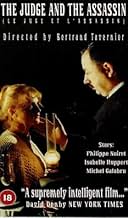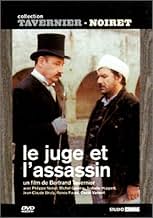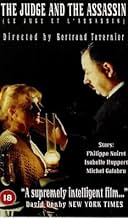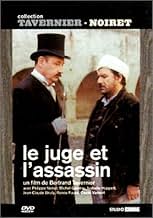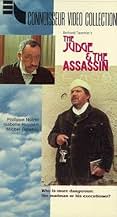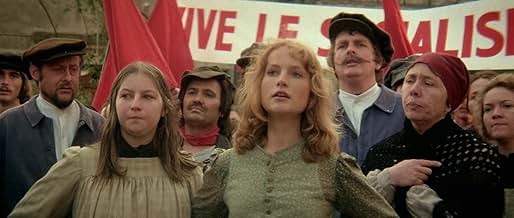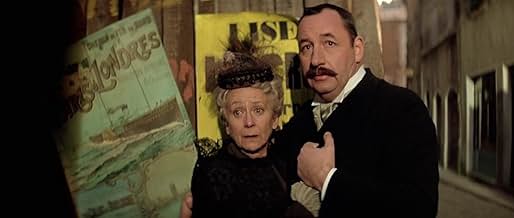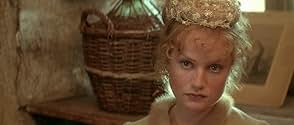PUNTUACIÓN EN IMDb
7,3/10
2,5 mil
TU PUNTUACIÓN
Añade un argumento en tu idiomaAn unstable former French Sergeant commits many atrocities. A judge considers how this case could benefit or damage his career.An unstable former French Sergeant commits many atrocities. A judge considers how this case could benefit or damage his career.An unstable former French Sergeant commits many atrocities. A judge considers how this case could benefit or damage his career.
- Dirección
- Guión
- Reparto principal
- Premios
- 3 premios y 4 nominaciones en total
Jean-Claude de Goros
- Dr. Dutourd
- (as Jean-Claude de Gorros)
Reseñas destacadas
A French provincial town in the late 1890's where a Judge attempts to advance his political power by trying to prove that a soldier was not insane at the time of committing murder, which means soilder gets the guillotine and not the mad house. A movie that is more about the social turmoil in France.
This stupendous film by Bertrand Tavernier is set against the background of the Dreyfus Affair and the workers' struggles which led to the formation of the Confédération Générale du Travail. Under the spotlight here is the abuse of power by institutions and the inequalities of the justice system.
The two leading protagonists are serial rapist and murderer Joseph Bouvier, based upon real life Joseph Vacher and played to the hilt by Michel Calabru whilst judge Fourquet has here become the unscrupulous Rousseau and is personified by the immaculate Philippe Noiret. His character is not, as an earlier reviewer has suggested, based upon forensic doctor Etienne Lacassagne who is here named Degueldre and is played by Yves Robert.
Bouvier and Rousseau could be said to represent both sides of the same coin. Bouvier is undeniably a monster but is clearly insane(or is he?) whilst Rousseau is in full possession of his faculties and is determined to have Bouvier guillotined in order to further his own ambition, even to the point of cleverly gaining Bouvier's trust so as to extract a full confession.
Ambiguity reigns supreme here and who better to play Rousseau than Noiret whose working relationship with Tavernier, numbering nine films, is a marriage made in heaven. Tavernier not only gifted Noiret challenging roles but wisely gave him free rein in performance. It is understandably Michel Calabru's tour de force as Bouvier that earned him a well-deserved César. His is inspired casting for he was mainly known for his appearances in the popular 'Gendarme' series and there was nothing in his cinematic CV that would suggest he was capable of a performance of this magnitude. His tenure throughout the 1950's with the Comédie Francaise undoubtedly stood him in good stead for this demanding role.
Marvellous support from Jean-Claude Brialy, veteran Renée Faure and moving up the ranks, the twenty-one year old Isabelle Huppert who would again work with Tavernier and Noiret in 'Coup de Torchon' and is here just one year away from her iconic role as 'La Dentelliere'.
We owe Tavernier a debt of thanks for having brought legendary writing duo Jean Aurenche and Pierre Bost in from the cold and as one would expect from exponents of 'cinéma de qualité', their script is beautifully crafted, intelligent and trenchant. Tavernier's unerring sense of place and period and his eye for detail are in evidence here whilst his preferred cinematographer Pierre-William Glenn ensures gorgeous rural images. Inspired score by another of Tavernier's regulars Philippe Sarde with the final song based upon revolutionary tunes from the Commune.
The final caption which points out that although Bouvier's unfortunate young victims numbered twelve, no less than twenty thousand children perished in the mines, serves as a stark reminder of how elusive was the concept of 'Liberté, Egalité, Fraternité'.
The two leading protagonists are serial rapist and murderer Joseph Bouvier, based upon real life Joseph Vacher and played to the hilt by Michel Calabru whilst judge Fourquet has here become the unscrupulous Rousseau and is personified by the immaculate Philippe Noiret. His character is not, as an earlier reviewer has suggested, based upon forensic doctor Etienne Lacassagne who is here named Degueldre and is played by Yves Robert.
Bouvier and Rousseau could be said to represent both sides of the same coin. Bouvier is undeniably a monster but is clearly insane(or is he?) whilst Rousseau is in full possession of his faculties and is determined to have Bouvier guillotined in order to further his own ambition, even to the point of cleverly gaining Bouvier's trust so as to extract a full confession.
Ambiguity reigns supreme here and who better to play Rousseau than Noiret whose working relationship with Tavernier, numbering nine films, is a marriage made in heaven. Tavernier not only gifted Noiret challenging roles but wisely gave him free rein in performance. It is understandably Michel Calabru's tour de force as Bouvier that earned him a well-deserved César. His is inspired casting for he was mainly known for his appearances in the popular 'Gendarme' series and there was nothing in his cinematic CV that would suggest he was capable of a performance of this magnitude. His tenure throughout the 1950's with the Comédie Francaise undoubtedly stood him in good stead for this demanding role.
Marvellous support from Jean-Claude Brialy, veteran Renée Faure and moving up the ranks, the twenty-one year old Isabelle Huppert who would again work with Tavernier and Noiret in 'Coup de Torchon' and is here just one year away from her iconic role as 'La Dentelliere'.
We owe Tavernier a debt of thanks for having brought legendary writing duo Jean Aurenche and Pierre Bost in from the cold and as one would expect from exponents of 'cinéma de qualité', their script is beautifully crafted, intelligent and trenchant. Tavernier's unerring sense of place and period and his eye for detail are in evidence here whilst his preferred cinematographer Pierre-William Glenn ensures gorgeous rural images. Inspired score by another of Tavernier's regulars Philippe Sarde with the final song based upon revolutionary tunes from the Commune.
The final caption which points out that although Bouvier's unfortunate young victims numbered twelve, no less than twenty thousand children perished in the mines, serves as a stark reminder of how elusive was the concept of 'Liberté, Egalité, Fraternité'.
I can't make a real judgment on this film, although the other reviews are rave ones. I just want to add that the story is based on an actual case of the 1890s in France. Joseph Vacher was the real life murderer who is the basis for Michel Galabrue's Joseph Bouvier. Like Vacher he was a former soldier, and he went about the countryside slaughtering young boy shepherds and young girl servants. His destruction of these victims (in terms of mutilations) rivaled his contemporary Jack the Ripper (Vacher was known as Vacher the Ripper). Although he was quite insane the public demanded a death penalty - he was guillotined in 1898. His crimes briefly took public attention off the matter of Captain Alfred Dreyfus.
The Philippe Noiret character is partly based on the noted criminologist Professor Alexander Lacassagne, who (despite considerable evidence of insanity) determined that Vacher was sane, and deserved the death penalty.
The Philippe Noiret character is partly based on the noted criminologist Professor Alexander Lacassagne, who (despite considerable evidence of insanity) determined that Vacher was sane, and deserved the death penalty.
Director Bertrand Tavernier and actor Philippe Noiret collaborated in 9 films. The 1976 'Le juge et l'assassin' is the third film they made together and is a remarkable film in many ways. The story takes place in the last decade of the 19th century, in a France that is still living through the trauma of the Paris Commune and the defeat in the Franco-Prussian war, a country deeply divided by the Dreyfuss case, crushed by social inequalities that gave impetus to the socialist movement but also encouraged anarchist groups and terrorist attacks. Against this background, Bertrand Tavernier together with Pierre Bost and Jean Aurenche wrote the screenplay of a film describing the case of a serial killer, a kind of French Jack the Ripper, focusing on the characters of the criminal and of the judge who does everything to catch and condemn him.
Sergeant Joseph Bouvier is a veteran of the wars of France. He loves a young woman who rejects him, and in desperation he decides to kill her and commit suicide. Neither the assassination nor the suicide succeed, he is declared irresponsible, but after a few years the doctors consider him cured and release him. Adopting a vagabond life, prey to chronic physical and mental suffering and a morbid mysticism, he crosses France from North to South, killing and raping 12 victims on his way, most of them children or teenagers. Judge Emile Rousseau leads a typical bourgeois life in a provincial town, with a possessive mother and a mistress of lower social status. The Bouvier case gives him an opportunity to stand out, but to do so he must secure a conviction, prevent the serial killer from being declared insane, and turn him into a symbol of all that is rotten in France. Sort of a serial killer Dreyfuss. The confrontation between the two is not just a meeting between an accuser and a criminal. Rousseau has on his side not only the intelligence and cunning that will enable him to win Bouvier's confidence, but also a whole legal and political machine at the service of a social class that fears the changes that will sooner or later take place . In the end it is a confrontation between two faces of France, both corrupt and destructive.
Philippe Noiret is, of course, formidable as always. The role of the cunning, ariviste and morally corrupt judge suits him perfectly. The most remarkable acting performance, however, belongs to Michel Galabru, an actor who until then had only made himself known on screens in comic roles (among them a gendarme from Louis de Funès' troupe in Saint-Tropez). The role of Bouvier allows Galabru to create a complex character, in which madness mixes with passion, mystical fervor with intellectual poetry. The cast also features Isabelle Huppert, who at 23, in the secondary role of Rose, the judge's mistress, was beautiful and already master of that mysterious expression that would mark her great roles to come. Bertrand Tavernier has always known how to collaborate with classy professionals. Pierre-William Glenn's cinematography is impressive, especially in the nature scenes. Philippe Sarde's music plays a very important role. There are several sung scenes in the film - by an officer declaiming a patriotic song about lost Alsace and Lorraine, by a troubadour singing a ballad to the murderer-turned-folk-hero, by working women demonstrating for their rights in the final scene. These, together with the very carefully designed sets and costumes, make 'Le juge et l'assassin' an extremely expressive film in rendering the atmosphere of the era. The biggest problem with the script is the overly obvious rhetoric, which doesn't want to leave any doubt about the political views of the screenwriters and of the director. I didn't think that was necessary. The story itself is quite strong and speaks for itself, and the level of acting plus the Noiret - Galabru duel are expressive enough without being explicit. Bertrand Tavernier could have let the cinema art that he mastered so well tell the whole story. It would have been sufficient.
Sergeant Joseph Bouvier is a veteran of the wars of France. He loves a young woman who rejects him, and in desperation he decides to kill her and commit suicide. Neither the assassination nor the suicide succeed, he is declared irresponsible, but after a few years the doctors consider him cured and release him. Adopting a vagabond life, prey to chronic physical and mental suffering and a morbid mysticism, he crosses France from North to South, killing and raping 12 victims on his way, most of them children or teenagers. Judge Emile Rousseau leads a typical bourgeois life in a provincial town, with a possessive mother and a mistress of lower social status. The Bouvier case gives him an opportunity to stand out, but to do so he must secure a conviction, prevent the serial killer from being declared insane, and turn him into a symbol of all that is rotten in France. Sort of a serial killer Dreyfuss. The confrontation between the two is not just a meeting between an accuser and a criminal. Rousseau has on his side not only the intelligence and cunning that will enable him to win Bouvier's confidence, but also a whole legal and political machine at the service of a social class that fears the changes that will sooner or later take place . In the end it is a confrontation between two faces of France, both corrupt and destructive.
Philippe Noiret is, of course, formidable as always. The role of the cunning, ariviste and morally corrupt judge suits him perfectly. The most remarkable acting performance, however, belongs to Michel Galabru, an actor who until then had only made himself known on screens in comic roles (among them a gendarme from Louis de Funès' troupe in Saint-Tropez). The role of Bouvier allows Galabru to create a complex character, in which madness mixes with passion, mystical fervor with intellectual poetry. The cast also features Isabelle Huppert, who at 23, in the secondary role of Rose, the judge's mistress, was beautiful and already master of that mysterious expression that would mark her great roles to come. Bertrand Tavernier has always known how to collaborate with classy professionals. Pierre-William Glenn's cinematography is impressive, especially in the nature scenes. Philippe Sarde's music plays a very important role. There are several sung scenes in the film - by an officer declaiming a patriotic song about lost Alsace and Lorraine, by a troubadour singing a ballad to the murderer-turned-folk-hero, by working women demonstrating for their rights in the final scene. These, together with the very carefully designed sets and costumes, make 'Le juge et l'assassin' an extremely expressive film in rendering the atmosphere of the era. The biggest problem with the script is the overly obvious rhetoric, which doesn't want to leave any doubt about the political views of the screenwriters and of the director. I didn't think that was necessary. The story itself is quite strong and speaks for itself, and the level of acting plus the Noiret - Galabru duel are expressive enough without being explicit. Bertrand Tavernier could have let the cinema art that he mastered so well tell the whole story. It would have been sufficient.
Intriguing courtroom drama based on true events , dealing with a nasty murderer called Bouvier : Michel Galabru , based on an actual series killer , proceeding a criminal spree throughout France and a prejudiced judge : Philippe Noiret who has his values challenged when he has to decide if the supect person is insane or no . And eventually, considering if it benefits or harms his career .
A suspenseful, thrilling and surprising movie with historical background during Dreyfuss affaire , and the publication of Emilio Zola's J'accuse....!. A good as well as provoking flick, including drama , thrills , violence and competent performances .The peculiar relationship that develops between the murderer and the judge in the movie's focus . It results to be a nice movie shot in French with English subtitles . Duo of protagonists , Michel Galabru and Philippe Noiriet, are frankly magnificent. They are well accompanied by a fine support cast , such as : Isabelle Huppert as judge's sweetheart , Renee Faure as possessive mother , Yves Robert and Jean Claude Brialy as Procureur.
It displays evocative and shining cinematograhy by Perre William Glenn , showing splendidly the French outdoors . As well as sensitive and moving musical score by Philippe Sarde . The motion picture was compellingly directed by Bertrand Tavernier . Bernard is deemed to be one of the best French fimmakers , writing and directing thought-provoking and interesting pictures , outstanding the following ones : "Captain Conan", "Revenge of the Musketeers" , "L627" , "Daddy Nostalgia", "Life and nothing but" , "Beatrice" , "Round Midnight", "A Sunday in the Country" , "Coup de Torchon" , Spoiled Children", "Death Watch" , "The Clockmaker" , among others . Rating : 7/10 . Better than average.
A suspenseful, thrilling and surprising movie with historical background during Dreyfuss affaire , and the publication of Emilio Zola's J'accuse....!. A good as well as provoking flick, including drama , thrills , violence and competent performances .The peculiar relationship that develops between the murderer and the judge in the movie's focus . It results to be a nice movie shot in French with English subtitles . Duo of protagonists , Michel Galabru and Philippe Noiriet, are frankly magnificent. They are well accompanied by a fine support cast , such as : Isabelle Huppert as judge's sweetheart , Renee Faure as possessive mother , Yves Robert and Jean Claude Brialy as Procureur.
It displays evocative and shining cinematograhy by Perre William Glenn , showing splendidly the French outdoors . As well as sensitive and moving musical score by Philippe Sarde . The motion picture was compellingly directed by Bertrand Tavernier . Bernard is deemed to be one of the best French fimmakers , writing and directing thought-provoking and interesting pictures , outstanding the following ones : "Captain Conan", "Revenge of the Musketeers" , "L627" , "Daddy Nostalgia", "Life and nothing but" , "Beatrice" , "Round Midnight", "A Sunday in the Country" , "Coup de Torchon" , Spoiled Children", "Death Watch" , "The Clockmaker" , among others . Rating : 7/10 . Better than average.
¿Sabías que...?
- CuriosidadesThis is a fairly straight-forward account of the crimes of Joseph Vacher. "Vacher" and "Bouvier" both mean "cowherd" in French. The names of many of the characters - like Lacassagne - have not been changed.
- PifiasYou can see the shadow of the microphone and the boom moving across the wall of the chapel where the priest is giving his sermon about five minutes after the beginning.
- ConexionesFeatured in Keskiyön auringon kuvat (1987)
- Banda sonoraLa Complainte de Bouvier l'Éventreur
Music by Philippe Sarde
Lyrics by Jean-Roger Caussimon
Performed by Jean-Roger Caussimon
Selecciones populares
Inicia sesión para calificar y añadir a tu lista para recibir recomendaciones personalizadas
- How long is The Judge and the Assassin?Con tecnología de Alexa
Detalles
- Duración2 horas 8 minutos
- Mezcla de sonido
- Relación de aspecto
- 2.35 : 1
Contribuir a esta página
Sugerir un cambio o añadir el contenido que falta

Principal laguna de datos
By what name was El juez y el asesino (1976) officially released in India in English?
Responde
![Ver Bande-annonce [OV]](https://m.media-amazon.com/images/M/MV5BMGRkZTUzMWItY2NmZi00YWFhLTllZTMtZmQzNmFjNmFkY2M5XkEyXkFqcGdeQXRyYW5zY29kZS13b3JrZmxvdw@@._V1_QL75_UX500_CR0)
